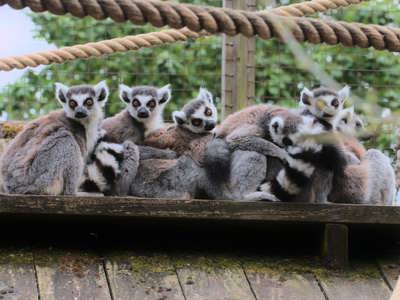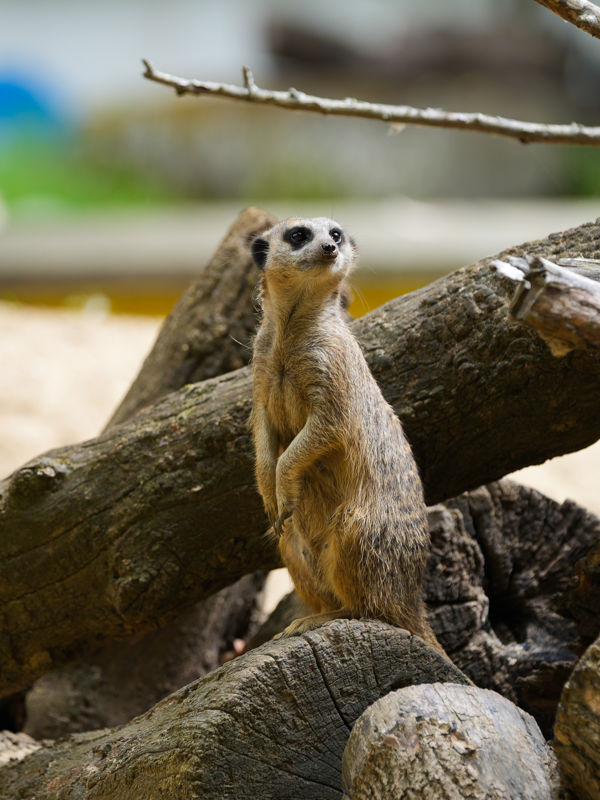
Giving lemurs the spotlight, not just on World Lemur Day, but every day
25th Oct 2024
Native to Madagascar, it’s thought that there are over 106 different species of lemur and we believe the ring-tailed lemur is the most distinctive!
Here at Battersea Park Children’s Zoo we have 6 wonderful ring-tailed lemurs and we want to shine a light on them for World Lemur Day on 25th October 2024.
Ring-tailed lemurs are primates. Being omnivores they eat plants, fruit, insects, invertebrates and even small birds and lizards.
Unfortunately due to habitat destruction and hunting they are classified as ‘Endangered’ on the IUCN red list. Their population is declining rapidly and it’s thought that if things don’t change, wild lemurs will have a population 95% smaller in Madagascar by 2050, than it currently stands today.
At Battersea Park Children’s Zoo we are part of the European Endangered Species Breeding Programme for ring-tailed lemurs, helping to conserve healthy populations of animals in captivity while safeguarding the genetic health of these wonderful primates.
Maurice, Minx, Barry, Bert, Ernie and Melman are our resident lemurs here at the zoo and they all have such unique personalities.
At 22, Maurice is the gentle old man of our lemur family, and the father of the other five lemurs who live at the zoo. Maurice is known for being gentle and letting his adult offspring eat first, hence his keepers often sneak him his favourite treats like sweet potato and carrots! In the wild, ring-tailed lemurs have an average lifespan of 18 years, meaning our professional keepers maintain regular health monitoring for Maurice to ensure he is in tip top shape for his age.
Move aside King Julian, Minx is the rightful queen of our lemur troop. As the only female in a matriarchal society, she is automatically the highest ranking lemur, meaning that the rest of her family have to wait while she tucks into her food first. Because of this, you can spot Minx, for being that little bit rounder than the others! Despite being the leader of the troop, she is still a gentle and quiet lemur most of the time, just don’t disturb her while she’s eating!
Barry is Maurice’s oldest son and is 17 years old. Being an older male does mean that like his Dad, he ought to wait until his siblings have eaten first, however Barry has learned to sit right next to the keeper’s entrance so that they spot him, and hand over his dinner before Minx has noticed it has arrived! Barry can often be spotted in the evenings having a snooze on a branch in his favourite olive tree.
Bert and Ernie are our mischievous twins. At 8 years old, both are known by the keepers for being a confident, intelligent pair. Bert and Ernie excel at training, and are able to follow a target stick, and jump onto the weighing scales! This helps our keepers keep track of how much they are eating, as well as their day to day health.
Melman is our noisiest lemur, and helps to show why the word ‘lemur’ means ‘ghost’ on Madagascar. He will regularly make an eerie wail, just to remind his keepers it’s time for his dinner! You can spot Melman as he has the brightest orange eyes, and can often be found sat on the roof with his arms out beside him in a yoga pose, sunbathing and warming his tummy, an important part of temperature regulation in this species.
Ring-tailed lemurs have long, distinctive tails that are longer than their bodies, with around 25 rings (12 or 13 white and 13 or 14 black). Their tails serve many purposes, including helping them balance and communicate with each other. Male lemurs also engage in "stink fights" by rubbing their tails on scent glands on their wrists. They then wave their scent-filled tails at rivals as a form of intimidation.
If you want to find out more about our ring-tailed lemurs, check out our daily keeper feeding time talk here at Battersea Park Children's Zoo.
What can I do to support lemurs?
- Visit Battersea Park Children’s Zoo - your visitor entrance fee goes towards animal conservation.
- Don't share pet lemur posts on social media - they are not pets and are often kept in poor conditions. Liking and sharing these posts supports their poor care and decline.
- Buy fair trade products that don’t support deforestation. Deforestation in Madagascar destroys their homes.
- Donate to charity Lemur Love who support lemurs to thrive in the wild.

Sign up to our newsletter
Join our mailing list in order to keep up to date with Zoo news and special offers.









